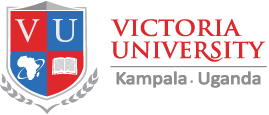Quick Facts
Credential
Bachelor's Degree
Delivery Options:
Both On-Campus and Online - Some of your Classes will be in-person, on campus and some will be done online.
Duration: Three Years
With a typical full-time course load, this programme will take Three Years to complete.
Language of instruction
english
Admission Requirements
Direct Entry
Candidate must have a minimum requirement of admission on a degree as required by Victoria University Uganda.
Candidates seeking admission on this scheme should have:
i. At least a credit in Mathematics and English at O’level.
ii. A candidate must have two principal passes at Advanced level obtained at the same sitting.
iii. The essential subjects are; Economics, Geography, Entrepreneurship, Fine Art, Technical Drawing, Literature, Computer Studies, electronics, Mathematics, Physics, Chemistry, Foods and Nutrition, Biology, Healthy Science and Agriculture.
iv. Any other subject done and passed at Advanced level is relevant.
v. General paper and Sub mathematics are desirable subjects.
Diploma
The Uganda Certificate of Education (UCE) or its equivalent, with a credit in Mathematics
Diploma in Computer Science, IT, Mathematics, Information Systems, Statistics, Computer Engineering or equivalent from a recognized institution.
Mature Age Entry Scheme
A candidate must be 25 years of age and above have passed mature age entry examination conducted by National Council for Higher Education (NCHE) or an institution accredited by NCHE. NCHE recognizes the following institutions’ mature age examinations:
i. Makererere University
ii. Gulu University
iii. Islamic University in Uganda Mbale
iv. Mbarara University f Science and Technology
The eligible candidate must have got two principal passes at A’level in relevant subjects and 5 passes at O’Level. They should have been obtained at the same sitting not consecutive sittings.
Admission Requirements for Undergraduate Students (Ugandans)
· UACE result slip
· UCE result slip
· Diploma transcript if applicable
· National ID/passport/ birth certificate
· Two passport photos
Admission fees UGX250,000
Bank: STANBIC BANK
Account: 9030020161085
Admission Requirements for Undergraduate student (Non-Ugandans)
· Secondary certificate from UNEB
· Diploma transcript if applicable from NCHE
· Certificate if applicable from NCHE
· National ID/passport/ birth certificate
· Two passport photos
· Admission fees $87
Bank: STANBIC BANK
USD Account: 9030020161247
Swift Code: SBICUGKX
What you will Learn
In a Bachelor of Information Technology (BIT) program, you will be exposed to a wide range of subjects and concepts related to the field of information technology. The specific courses may vary depending on the university or institution offering the program, but here are some common areas of study typically covered in a BIT programme.
Programming: Students will learn programming languages such as Java, C++, Python, or JavaScript and acquire skills in software development, coding, and problem-solving.
Database Management: This course focuses on the design, implementation, and management of databases, teaching students how to store, retrieve, and manipulate data effectively.
Networking: Students will gain an understanding of computer networks, including network protocols, configurations, security, and troubleshooting.
Web Development: This course explores the creation and maintenance of websites, covering topics such as HTML, CSS, web design principles, and client-side and server-side scripting.
Software Development: Students will learn about the software development life cycle, including requirements gathering, design, coding, testing, and maintenance.
Systems Analysis: This course delves into the analysis and design of information systems, teaching students how to identify user requirements, model system processes, and propose efficient solutions.
Cybersecurity: Students will study the principles of cybersecurity, including threat detection, risk assessment, network security, and ethical hacking techniques.
Project Management: This course focuses on the principles and techniques of project management, including planning, resource allocation, scheduling, and project evaluation.
Data Analytics: Students will learn how to extract insights from large datasets, apply statistical analysis techniques, and use data visualization tools to communicate findings effectively.
IT Ethics and Professionalism: This course covers ethical considerations and professional responsibilities in the IT industry, including issues related to privacy, intellectual property, and social implications of technology.
Career Opportunities
Upon completing a Bachelor of Information Technology (BIT) program, graduates can pursue various career opportunities in the field of information technology. Some potential career paths include:
Software Developer/Engineer: Designing, coding, and testing software applications and systems.
Systems Analyst: Analyzing and evaluating computer systems to improve efficiency and effectiveness.
Database Administrator: Managing and maintaining databases, ensuring data integrity and security.
Network Administrator: Managing and maintaining computer networks, including routers, switches, and security protocols.
Web Developer: Creating and maintaining websites and web applications.
IT Project Manager: Leading and overseeing IT projects, ensuring successful completion within budget and timeline.
IT Consultant: Providing expert advice and guidance to organizations on IT strategies, solutions, and implementation.
Cybersecurity Analyst: Protecting computer systems and networks from security threats and breaches.
Data Analyst/Scientist: Analyzing and interpreting complex data to extract insights and support decision-making.
IT Auditor: Evaluating and assessing the effectiveness of IT systems and controls within organizations.
IT Support Specialist: Providing technical assistance and troubleshooting for computer hardware, software, and network issues.
IT Trainer/Educator: Teaching and training individuals or organizations on various IT concepts and technologies.
Tuition & Fees
The tuition and fee amounts are estimates based on current academic year's rates. For financial planning purposes, please use these totals as an approximate estimate of your costs. Actual fees may vary by term and enrolment activities.
Download
